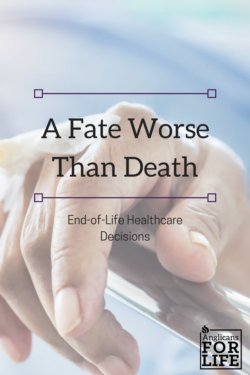I have always seen this particular idiom as a sarcastic way of expressing disdain for something. “Sitting through dinner with her is a fate worse than death.” But as Anglicans for Life addresses end-of-life issues, this idiom caused me to really consider—what is a fate worse than death?
Let’s start by recognizing that death, according to Merriam Webster Dictionary, is the “irreversible cessation of all vital functions especially as indicated by permanent stoppage of the heart, respiration, and brain activity.” Death is the end of a person’s life and history, generates grief for those  who loved the person, and is permanent.
who loved the person, and is permanent.
According to the same dictionary, fate as a noun is defined as the “development of events beyond a person’s control, regarded as determined by a supernatural power.” (Christians, of course, know that “supernatural power” as our loving Heavenly Father.) The focus I want to place on this definition, however, is that fate involves events our beyond our control.
So, a fate worse than death, is the idea that circumstances beyond our control can be worse than no longer existing at all. Applying this to end-of-life thinking, what is a fate worse than dying?
• Being left to die, alone
• Being denied medical care to survive or recover
• Being starved to death
• Having medical care, including food and fluids, withheld in order to cause death, because keeping a person alive is too expensive
• Having loved ones support euthanizing patients instead of caring for them
• Being declared dead while still living
Sadly, this list of awful circumstances is a reality for many people, young or old, who are either terminally ill, suffering from a life-threatening traumatic injury, or facing complications of an aging body. Often, they are deemed better off dead, as healthcare for them is expensive and extensive.
Examples of young children who faced this fate include Charlie Gard, Alfie Evans, and Israel Stinson. Charlie and Alfie were from England and both were denied the opportunity to be relocated to different hospitals in other countries for additional medical treatment. Instead the courts sided with the hospitals, declaring it was acceptable and appropriate to remove life support even against their parents’ wishes.
In the United States, Israel Stinson met a similar fate. This is his story as explained by his mother, Jonee Fonseca, which was shared in May 2016 on the Life Legal Defense Foundation website:
“Doctors at Kaiser Roseville Medical Center declared Israel ‘brain dead’ after an asthma attack left him unconscious. Israel had been on a ventilator since April 2nd and was declared brain dead on April 14.
The hospital wanted to remove our son from life support. They said Israel would only live for a few days, and his heart would soon stop beating. But, one month later, Israel proved the doctors wrong. He was a fighter!
We had been able to keep Israel on life support with the help of our legal team, but it was a tough battle.
Three weeks ago, Israel started moving his head and upper body in response to our voice and touch. He kicked his legs. And he took some breaths on his own “over” or in addition to the ventilator.
The doctors who declared Israel “dead” could see our son move his head and body in response to my voice. They listened to his beating heart. But they refused to feed him. And because he didn’t pass their test—a test that had been given almost a month previously—they wanted to kill him.
We were able to get Israel transferred to a hospital in Central America, where a wonderful team of pro-life doctors provided him with appropriate care and nutrition. Not only was Israel’s digestive system fully functional, but brain scans showed that Israel had active brain waves, which meant he was not brain dead.
Because Israel’s insurance company would not pay for his care overseas, Israel had to be transferred back to the U.S. The receiving hospital refused to reexamine Israel and would not permit an independent neurologist to examine him. As we were making arrangements to care for our son at home, the hospital abruptly withdrew his ventilator, ending Israel’s life.”
Another case also being addressed by Life Legal involves Joel Zuniga, as featured on their website:
A hospital in Jacksonville, Florida has threatened to withdraw food and water from a patient who recently suffered a gunshot wound. Joel Zuniga was unable to breathe without the assistance of a ventilator after being shot. Two weeks after Joel’s injury, his family made the difficult decision to remove his ventilator to see if he could breathe on his own.
Fr. David Nix, the family’s priest and a former EMT and paramedic, encouraged the family to instruct the hospital not to give Joel a heavy dose of narcotics when doctors removed the ventilator, so as not to suppress his ability to breathe. The hospital begrudgingly complied.
Fr. Nix was present to administer last rites. Joel struggled to breathe for a few minutes and then, miraculously, began taking full breaths. He has now been off of artificial respiration, and his vital signs are good.
Although Joel has suffered brain damage and is unable to speak, he is awake and is starting to show some response when his family talks to him.
But the hospital refused to provide Joel with proper nutrition and hydration. The family finally convinced doctors to give Joel an IV, but they still refuse to adequately feed Joel. Healthcare providers have also tried to pressure Joel’s parents—who only speak Spanish—to sign a form that would only give Joel “comfort” care in an attempt to withdraw all treatment, including food, water, and antibiotics. Joel’s projected “quality-of-life” is the reason his physician has decided to withhold all food from this patient.
“This is one of the most egregious cases of denial of healthcare I have seen,” said Alexandra Snyder, Life Legal Defense Foundation’s Executive Director. “Joel’s parents are particularly vulnerable because they do not speak English. The hospital is exploiting their inability to question a course of action that puts Joel’s life at risk. Joel is a young man in his early thirties who is showing remarkable signs of recovery, yet the hospital is taking aggressive measures to shorten his life.”
Another case Life Legal was involved with relates to the fate of the elderly:
“Last week, Life Legal received a call from the daughter of a 93-year-old woman who was being deprived of nutrition and hydration in a Northern California hospital. Our team responded immediately by filing court pleadings demanding that the woman receive proper care. Life Legal attorney Terry Thompson then appeared before a judge to seek a temporary restraining order prohibiting the hospital from putting the woman to death.
We were successful in obtaining the order! The woman had been without food and water for three days and was near death, but she is now recuperating thanks to the efforts of the Life Legal team.
It should be noted that the woman does not have a terminal illness. She is able to breathe on her own. Yet the hospital believed it was within its rights to end her life without her consent or the consent of her family, because she was elderly.”
I am grateful for the work of Life Legal, and their website has many more stories of families literally fighting for the lives of loved ones.
In all the cases noted on their website, a common denominator for the families is that none of them expected a health crisis, so they were unprepared for the challenges of trying to keep their loved one alive. While we all hope to die naturally, none of us know who will or who won’t face a fate worse than death.
So how can we be prepared?
Everyone over the age of 18 should appoint someone to serve as their Power of Attorney for HealthCare, which is considered an Advance Directive. Anglicans for Life also recommends we begin having conversations about what is important to us regarding our healthcare in the event of an emergency, while cautioning against making general statements like, “I don’t want to be hooked up to machines.”
Another type of Advance Directive is a Living Will, which is a written set of instructions regarding your preferences for healthcare and goes into effect if you are unable to make decision for yourself or if you are permanently unconscious. AFL does NOT recommend you sign a Living Will as The Journal of Emergency Medicine reports that a 2012 study found 78% of physicians misinterpreted Living Wills as Do Not Resuscitate orders.
Appointing a person who understands your values and has the fortitude to advocate for your rights will provide the best chance of insuring you receive the medical care you need and deserve until natural death occurs.
Recognizing that a divide can exist between the medical treatment we believe is best for our loved one and what the hospital or physician thinks is appropriate or futile is important. It can be shocking to be told that something as basic as food and fluids are not to be provided for the patient, and we must prayerfully, graciously, but firmly question such orders.
It is sad to say, but the healthcare industry has changed dramatically in the last twenty years, and profits often trump patients’ needs. When patients, like those noted above, are diagnosed brain-dead or terminal, it gives the hospital the freedom to remove medicines, treatments, food, and fluids and place the person in “comfort care”, which can lead to terminal sedation and pre-mature death.
As a side note—it is important to recognize that as much as we love and respect doctors and nurses, they are not infallible. We must be aware that misdiagnoses happen and that hospitals are not always focused on the patient’s best interest. A simple internet search of “’brain dead’ patients who didn’t die”, revealed that 25 people in the last six years recovered from their fatal diagnosis. A few patients actually woke up or moved just as their organs were about to be removed for transplant. (Recognizing the value of organs from “live” donors is critical in appreciating the haste of some doctors in declaring a person brain dead.)
This is why, when we find ourselves or our loved ones in these circumstances, we need to appreciate the necessity of appointing a Power of Attorney for HealthCare to be our advocate and help find alternative solutions for how to care for us or them until we or they recover or die naturally.
Hospice, a nursing home, or rehabilitation facility may be the best solution in some cases. But in the extreme cases, like when a brain dead diagnosis allows health insurance companies to deny coverage, special “Safe Haven” facilities must be available to receive the patient and extend care. A Safe Haven is a state-of-the-art pro-life medical facility staffed and equipped to provide competent and compassionate care for patients who want life-sustaining treatment but are denied it at other medical facilities. The primary purpose of a Safe Haven facility is to honor and care for the lives of patients who would otherwise die due to the denial of life-sustaining treatment. Anglicans for Life is working to address this need. We shared our vision for it last July in a letter to our donors and are working in partnership with other life-affirming groups to establish one of these facilities.
When admission to a Safe Haven facility is requested by a patient, family, or person acting on behalf of a patient, the patient’s/family’s ability to pay for treatment and whether or not the patient’s care will be covered by insurance will not be a factor in the decision to admit the patient to a Safe Haven. A Safe Haven will be supported mainly by private donations and volunteers who assist paid staff in caring for patients and office work.
The vision for Safe Havens is similar to pregnancy centers in terms of providing care that would otherwise not exist; however, fewer of them will exist because of the costs associated with running them.
A BreakPoint article recently noted that “The economic contribution of religious bodies to the American economy has been estimated at over $1 trillion. Substantial portions of the care delivered to poorer and needier Americans come from religious people working through their congregations and other ministries.”
On the issue of abortion, the Church has remained one of the strongest voices advocating for the unborn and the sacredness of the life of both the mother and child. Now a new group of people are at risk—the elderly, ill, and vulnerable who are in danger of being euthanized or having their deaths hastened. And, given the fact that the Church has the promise of the Gospel to address the reality of death, I am certain we are part of God’s solution to the end-of-life circumstances, which are seen to be a fate worse than death.
We ask that you be in prayer for AFL as we continue with the Safe Havens endeavor and to be thinking making life-affirming healthcare decisions for yourself and your love ones, as well as what you can do to protect those at risk of having their lives prematurely ended.
Written by The Rev. Georgette Forney. This was originally published in the May 2018 Carpe Diem.



